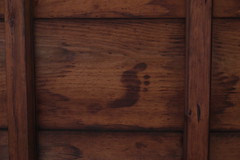 血の天井京都
血の天井京都In several temples around Kyoto, the ceilings were built using old lumber from Fushimi Momoyama Castle, which was destroyed in 1623.
That in and of itself is not particularly interesting. The old planks though were soaked through with the blood of hundreds of warriors, in places leaving clear footprints, handprints, and in places even images that look like faces.
In 1592 Toyotomi Hideyoshi succeeded in uniting Japan under his rule. As part of a celebration of that accomplishment, he had a castle built in Fushimi, Kyoto, which was to serve as his retirement palace.
The castle and Hideyoshi did not survive however. Following his death, in 1598, a power vacuum arose. That was soon filled by Ieyasu Tokugawa.
In 1600 Tokugawa, however, soon found himself in a bit of a tight spot. Tokugawa had 2,000 of his troops garrisoned in Fushimi Castle as yet another general approached with 40,000 troops.
Fushimi Castle was destroyed after an eleven-day-long siege in 1600 by the 40,000-strong army of Ishida Mitsunari, one of the late Toyotomi Hideyoshi's generals. The leader of the troops within the castle, Torii Mototada refused to surrender.
Ultimately, he committed ritual suicide as the castle burned around him after ordering his men to fight to the death. This allowed Tokugawa time to escape. In addition to Mototada, his family and nearly 400 soldiers committed suicide, thus soaking the floorboards with blood.
Those same floorboards were used in other locations after the castle was dismantled in 1623.
Among them are Genkoan (pictured above right), Shodenji Temple (below), and Yogenin.
Information
Genkoan
47 Kitatakagaminecho Takagamine Kirta-ku Kyoto,
Tel : 075 492 1858
Entrance Fee: 450 yen
Shodenji Temple
72 Kitachinjuan-cho Nishigamo Kita-ku, Kyoto
075 491 3259
Entrance Fee: 300 yen
 © CycleKyoto.com
© CycleKyoto.comTags
Japan
Genkoan
Kyoto
Cycle
Bloody Ceilings
No comments:
Post a Comment